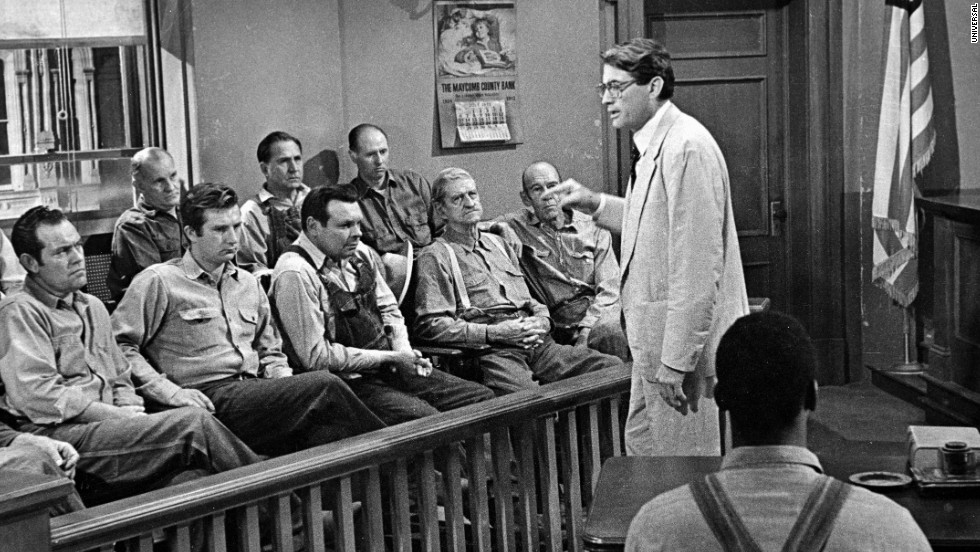
Tuesday
What kind of impeachment trial can we expect with Senate Majority Leader Mitch McConnell informing us that he’s “coordinating with the White House counsel. There will be no difference between the president’s position and our position as to how to handle this, to the extent that we can”? And with one of the jurors, South Carolina’s Sen. Lindsey Graham, asserting, “I am trying to give a pretty clear signal I have made up my mind. I’m not trying to pretend to be a fair juror here”?
It’s safe to say we’ll probably see a trial similar to the one in Harper Lee’s To Kill a Mockingbird, complete with predetermined outcome.
We see oaths sworn in both. As The Hill reports about the one in the Senate,
Supreme Court Chief Justice John Roberts administered the oath to senators, who were standing at their desks on the Senate floor with their right hands raised.
“Do you solemnly swear that in all things appertaining to the trial of the impeachment of Donald John Trump, president of the United States, now pending, you will do impartial justice according to the Constitution and laws, so help you god?” Roberts asked senators.
Senators then walked down to the front of the chamber as their names were called to sign the oath book.
While we don’t see the jurors in the novel sworn in, we do see Bob Ewell swearing—falsely swearing as it turns out—to tell the truth and nothing but the truth:
In answer to the clerk’s booming voice, a little bantam cock of a man rose and strutted to the stand, the back of his neck reddening at the sound of his name. When he turned around to take the oath, we saw that his face was as red as his neck. We also saw no resemblance to his namesake. A shock of wispy new-washed hair stood up from his forehead; his nose was thin, pointed, and shiny; he had no chin to speak of—it seemed to be part of his crepey neck.
“—so help me God,” he crowed.
As the trial unfolds, it’s clear that the Ewells have fabricated a rape that never happened. In our own trial, it appears that Donald Trump’s defense team may not even contest the fact that he extorted Ukraine for dirt on Joe Biden. As more damning evidence emerges every day, we may be like the hopeful Jem, who along with Scout and Dill is witnessing the trial from the balcony:
Jem seemed to be having a quiet fit. He was pounding the balcony rail softly, and once he whispered, “We’ve got him.”
As a child, however, Jem is under the mistaken impression that the truth matters. Dill, meanwhile, is so unnerved by the ugliness of the prosecution that he becomes sick. The town’s supposed drunkard, who has a black mistress and mixed-race children, points to the learning curve that awaits him:
He jerked his head at Dill: “Things haven’t caught up with that one’s instinct yet. Let him get a little older and he won’t get sick and cry. Maybe things’ll strike him as being—not quite right, say, but he won’t cry, not when he gets a few years on him.”
“Cry about what, Mr. Raymond?” Dill’s maleness was beginning to asset itself.
“Cry about the simple hell people give other people—without even thinking. Cry about the hell white people give colored folks, without even stopping to think that they’re people, too.”
In his summary statement, Atticus Finch observes that Tom Robinson’s case puts the court system itself on trial. Likewise, we could say that these impeachment hearings put the U.S. Senate on trial. Imagine the senators are hearing the closing argument of American literature’s most beloved lawyer:
Gentlemen, a court is no better than each man of you sitting before me on this jury. A court is only as sound as its jury, and a jury is only as sound as the men who make it up. I am confident that you gentlemen will review without passion the evidence you have heard, come to a decision, and restore this defendant to his family. In the name of God, do your duty.
Atticus’s eloquence falls on deaf ears. When the jury in the novel unanimously delivers a guilty verdict, Jem can’t believe what he has just witnessed:
“Atticus—” said Jem bleakly.
He turned in the doorway. “What, son?”
“How could they do it, how could they?”
“I don’t know, but they did it. They’ve done it before and they did it tonight and they’ll do it again and when they do it—seems that only children weep. Good night.”
Will we weep when that Senate delivers its verdict? Or have we become so numbed that the tears will no longer flow?

